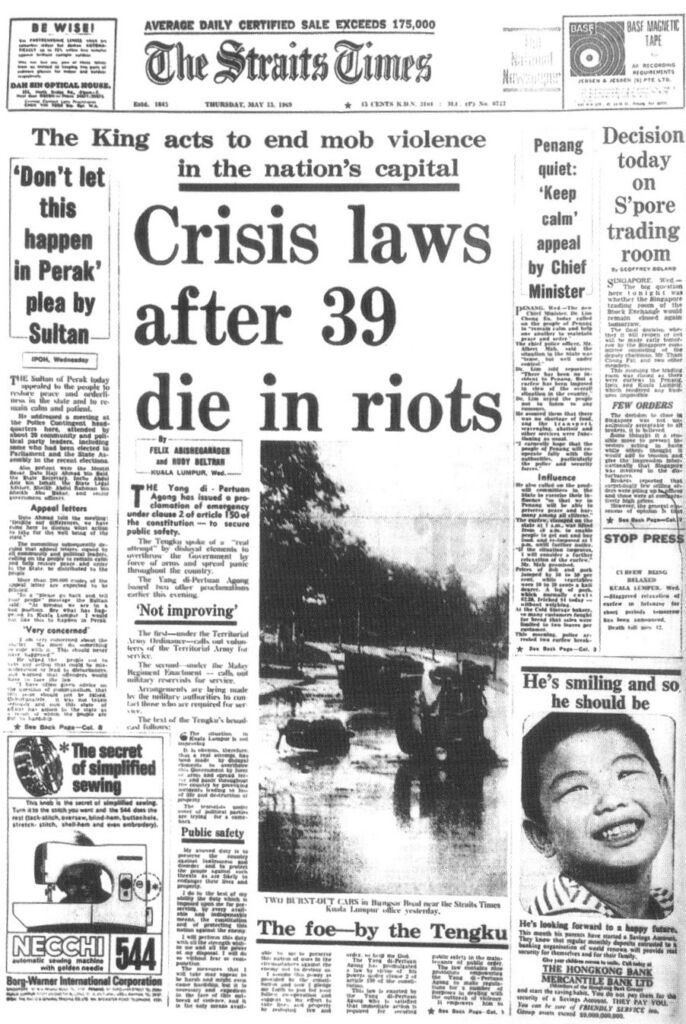On May 13, 1969, Malaysia experienced one of its darkest episodes. The racial riots that broke out on that day resulted in the loss of hundreds of lives, widespread destruction of property, and a long-lasting scar on the country’s social and political fabric.

The roots of the May 13 racial riots can be traced back to the country’s complex history of ethnic diversity and political tensions.
Malaysia was then a young country that had gained independence from British colonial rule just 12 years earlier. The country was made up of a mix of different ethnic groups, primarily Malay, Chinese, and Indian.
Interactions between the three groups up to that point were limited, which in turn fostered a sense of tension and mistrust among each other.
According to online academic journals, the trigger for the May 13 riots was the results of the general election held a few days earlier.
The ruling Alliance coalition, which was mainly supported by the Malay community, had narrowly won the election. However, the opposition parties, which had a significant following among the non-Malay community, managed to deny the Alliance a clear majority in the wealthy states of Selangor and Perak.
After a series of rallies and counter-rallies in Kuala Lumpur, the national capital which was then a part of Selangor, violence soon broke out between Malays and non-Malays.
Mobs went on a rampage, attacking and looting shops, homes, and vehicles belonging to members of other ethnic groups. The police were overwhelmed, and the government declared a state of emergency to contain the chaos.

The violence lasted for several days, with reports of numerous shootings, stabbings, and arson attacks, mostly around Kuala Lumpur.
According to official estimates, the riots resulted in the deaths of 196 people, with many more injured and displaced. The government responded with harsh measures, including the deployment of troops and suspensions of civil liberties.
The May 13 racial riots had a profound impact on Malaysia’s social and political landscape.
Following the tragedy, the government implemented a series of affirmative action policies for the Malay community, who were economically disadvantaged upon the country’s independence due to British colonial policies.
However, these policies also bred resentment among other ethnic groups and contributed to greater division along racial lines in Malaysia.
While these policies were initially intended as temporary measures to uplift the Malay community, they have continued to influence political discourse and ignite debates surrounding race and identity until today.
On the one hand, proponents argue that these affirmative action policies have been crucial in bridging socioeconomic gaps and empowering marginalized communities.
They contend that these measures were necessary to correct historical injustices and foster a more equitable society. Additionally, they believe that maintaining a delicate balance between different ethnic groups is vital for preserving social harmony and stability.
On the other hand, critics argue that race-based policies have inadvertently perpetuated divisions and hindered the nation’s progress toward true unity.
They argue that privileging one ethnic group can lead to feelings of marginalization and resentment among others. Moreover, they assert that such policies can stifle meritocracy, limit economic opportunities, and discourage foreign investments, ultimately hindering Malaysia’s overall development.
In recent years, Malaysia has witnessed a shift in its political landscape, with increased calls for a more inclusive approach that transcends ethnic boundaries.
The rise of multi-ethnic coalitions and the emergence of voices advocating for a Malaysia that embraces diversity and equal opportunities reflected a growing desire for post-racial politics.
However, it is important to acknowledge that deeply ingrained racial issues cannot be resolved overnight.
Malaysia’s journey towards a truly inclusive society requires continued dialogue, empathy, and efforts to address the underlying socio-economic disparities that contribute to racial tensions.
It is only through that difficult struggle that new policies, prioritizing meritocracy, equal opportunities, and social mobility for all Malaysians, regardless of their ethnic backgrounds, can ever truly be enacted.



